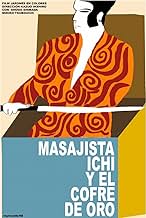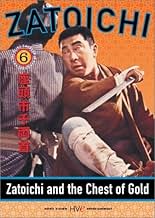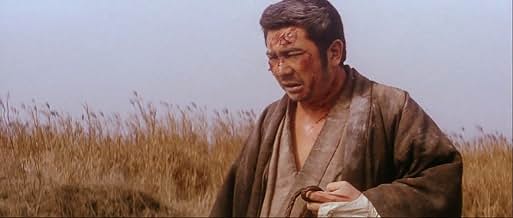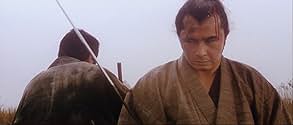IMDb RATING
7.3/10
1.9K
YOUR RATING
Zatoichi is mistaken for a thief. To clear his name he must find and defeat the real villain.Zatoichi is mistaken for a thief. To clear his name he must find and defeat the real villain.Zatoichi is mistaken for a thief. To clear his name he must find and defeat the real villain.
- Director
- Writers
- Stars
Tomisaburô Wakayama
- Jûshirô
- (as Jo Kenzaburo)
Kenjirô Uemura
- Gundayu Matsui
- (uncredited)
- Director
- Writers
- All cast & crew
- Production, box office & more at IMDbPro
Featured reviews
I had low expectations for this film but have to say it was a pleasant surprise. The story had humor, visually it was very interesting, and at times beautiful. The lead actor is very good and I'd like to see more of his work.
The following review is an extract from the book "Shintaro Katsu´s Zatoichi: Complete guide to all movies", which is now available on Amazon.
"This is the sixth part of a saga of films shot in the 1960s about the adventures of the blind swordsman Zatoichi. Always motivated by deep convictions and a strong sense of honour, on this occasion Ichi must shed light on the robbery committed against humble peasants in order to prove that he had nothing to do with the crime. Two intriguing women, the clever Ogin and the young Chiyo (sister of the warrior who killed Zatoichi the previous year) will try to prevent the blind masseur from fulfilling his laudable purpose.
(...) In "The chest of gold" we have the rare privilege of seeing in the same film the two masters of the chanbara genre: On the one hand Shintaro Katsu as the heroic Zatoichi and on the other his brother Tomisaburo Wakayama (Ogami Itto en Kozure Okami / "Lone Wolf and Cub") as his antagonist the evil ronin Joshiro. Just as in "Zatoichi's Pilgrimage" (also directed by Kazuo Ikehiro) his opponent Tohachi (Isao Yamagata) has as particularity his skill with kyudo (archery), here Joshiro stands out in the use of another weapon or combative technique: the whip."
"This is the sixth part of a saga of films shot in the 1960s about the adventures of the blind swordsman Zatoichi. Always motivated by deep convictions and a strong sense of honour, on this occasion Ichi must shed light on the robbery committed against humble peasants in order to prove that he had nothing to do with the crime. Two intriguing women, the clever Ogin and the young Chiyo (sister of the warrior who killed Zatoichi the previous year) will try to prevent the blind masseur from fulfilling his laudable purpose.
(...) In "The chest of gold" we have the rare privilege of seeing in the same film the two masters of the chanbara genre: On the one hand Shintaro Katsu as the heroic Zatoichi and on the other his brother Tomisaburo Wakayama (Ogami Itto en Kozure Okami / "Lone Wolf and Cub") as his antagonist the evil ronin Joshiro. Just as in "Zatoichi's Pilgrimage" (also directed by Kazuo Ikehiro) his opponent Tohachi (Isao Yamagata) has as particularity his skill with kyudo (archery), here Joshiro stands out in the use of another weapon or combative technique: the whip."
10inframan
I think this stunning film ranks among the great action films of all time but could be hung as stills in any art museum. Hokusai & Hiroshige influences abound.
Yet best of all is the unforgettable character Zatoichi himself. Shintaro Katsu created an everyman/superhero who had no equal, at least in western culture. A squat, homely, bandy-legged self-deprecating blind man full of humor & humility & an abundance of spirituality. And could he make that sword dance.
These movies have no equal. Each one is as perfectly made as any movie can be. I used to go see them when they first appeared in the theaters of San Francisco & Los Angeles Japanese neighborhoods. I still love them every bit as much now.
Yet best of all is the unforgettable character Zatoichi himself. Shintaro Katsu created an everyman/superhero who had no equal, at least in western culture. A squat, homely, bandy-legged self-deprecating blind man full of humor & humility & an abundance of spirituality. And could he make that sword dance.
These movies have no equal. Each one is as perfectly made as any movie can be. I used to go see them when they first appeared in the theaters of San Francisco & Los Angeles Japanese neighborhoods. I still love them every bit as much now.
Zatoichi and the Chest of Gold is one of the most entertaining entries in the franchise and on the same level as the strong predecessor Zatoichi on the Road. The movie starts with Zatoichi paying respects at the grave of a man he wrongfully killed two years ago. He meets some local villagers who are celebrating the fact that they are finally able to pay their tax debts to the local intendant. However, the chest with the money from eighteen different villagers gets stolen by some ruthless ronin. Since Zatoichi was seen near the scene of the crime, he gets accused of a crime he didn't commit and swears to find the real culprit in order to clear his name. Zatoichi starts his investigation by meeting a bandit who has found refuge on a mountain after he was chased away by political opponents. Zatoichi finds out that some of the bandit's men went rogue but realizes the bandit himself is innocent. They team up in order to clear their names, fight the local intendant and his associates who are behind the theft and conspiracy and help the upset villagers.
There are several reasons why this film stands out. First of all, it has a quite fast pace and doesn't waste any time with a lengthy introduction or an overlong conclusion. No scene is unnecessary and no minute is wasted in this dynamic film. Secondly, the movie has a sociocritical component as it portrays how abusive politicians are only interested in their own objectives while poor villagers are constantly tricked and tortured. Thirdly, the movie includes some straightforward humor for the first time in the franchise. In one scene, Zatoichi surprises a beautiful woman in a hot spring and then coincidentally discovers two young perverted men who were peeping through a window in the roof. In another scene, an ugly prostitute offers her services to Zatoichi who remains polite aside of commenting that the woman smells like a field of pumpkin flowers until he realizes that the prostitute demands a hefty sum for a massage which leads him to suggest her she should take a bath from time to time.
In the end, Zatoichi and the Chest of Gold is an entertaining, fast-paced and refreshingly vivid entry in the franchise and you won't see the film's eighty-three astonishing minutes pass. Aside of the refreshing new elements, the fight sequences are great to watch as usual and especially the final duel between the blind masseur and a man on horseback using a whip is quite memorable. Fans of martial arts films can't get around this energetic film that has aged rather well without losing its connection to rural Japan in the mid-nineteenth century.
There are several reasons why this film stands out. First of all, it has a quite fast pace and doesn't waste any time with a lengthy introduction or an overlong conclusion. No scene is unnecessary and no minute is wasted in this dynamic film. Secondly, the movie has a sociocritical component as it portrays how abusive politicians are only interested in their own objectives while poor villagers are constantly tricked and tortured. Thirdly, the movie includes some straightforward humor for the first time in the franchise. In one scene, Zatoichi surprises a beautiful woman in a hot spring and then coincidentally discovers two young perverted men who were peeping through a window in the roof. In another scene, an ugly prostitute offers her services to Zatoichi who remains polite aside of commenting that the woman smells like a field of pumpkin flowers until he realizes that the prostitute demands a hefty sum for a massage which leads him to suggest her she should take a bath from time to time.
In the end, Zatoichi and the Chest of Gold is an entertaining, fast-paced and refreshingly vivid entry in the franchise and you won't see the film's eighty-three astonishing minutes pass. Aside of the refreshing new elements, the fight sequences are great to watch as usual and especially the final duel between the blind masseur and a man on horseback using a whip is quite memorable. Fans of martial arts films can't get around this energetic film that has aged rather well without losing its connection to rural Japan in the mid-nineteenth century.
In this classic samurai tale, we follow the deadly trail of Zatoichi-a blind swordsman who has sworn to prove his innocence with regards to his unknowing involvement with the robbery of a chest of gold containing the local farmers tax payment while bringing the real culprits to justice. Here we have the classic hero, the defender and champion of the poor albeit here a most unlikely since the farm villagers think he was responsible for the robbery and he is as he might say "a simple blind man". A bit of suspension of disbelief is required but boy is this ever great stuff! Any fan of sword-fighting films should find much to enjoy here.
Did you know
- TriviaJushiro is played by Shintarô Katsu's real-life brother, Tomisaburô Wakayama, who would later star in the Lone Wolf and Cub series of films (produced by Katsu).
- ConnectionsFeatured in Best in Action: 1964 (2020)
- How long is Zatoichi and the Chest of Gold?Powered by Alexa
Details
- Release date
- Country of origin
- Language
- Also known as
- La légende de Zato Ichi
- Production company
- See more company credits at IMDbPro
- Runtime
- 1h 23m(83 min)
- Aspect ratio
- 2.35 : 1
Contribute to this page
Suggest an edit or add missing content





























